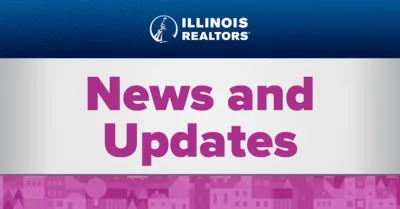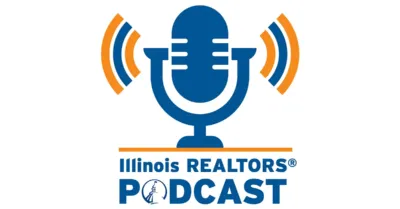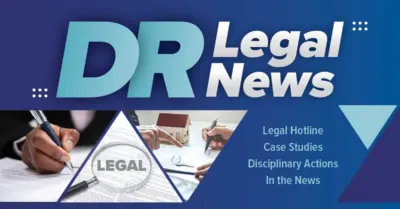Hot on the Hotline: Understand your employment contract and know when disclosures are required in a sell
A recent surge in questions to the Illinois REALTORS® Legal Hotline indicates that some members may want to review the terms of their employment contracts and the exceptions to sellers’ disclosures so they can avoid making incorrect assumptions.
Changing Brokerages? The importance of knowing the terms of the employment/independent contractor agreement.
The Legal Hotline is getting a large volume of calls related to licensees wanting to know their “rights” to compensation for licensed activity they performed for one sponsoring broker before they moved to another brokerage.
In many cases, a sponsoring broker is willing to pay a licensee for licensed activities completed during their sponsorship. This is provided for under the Real Estate License Act (RELA) Section 10-5 (a) which says a sponsoring brokerage may pay compensation directly to a licensee sponsored by another or a person who is not sponsored by a broker if the payments are made pursuant to terms of an employment agreement that was previously in place between a licensee and the non-sponsoring broker, and the payments are for licensed activity performed by that person while previously sponsored by the now non-sponsoring broker. Note that, by definition, RELA says the term employee and any derivative of that term includes independent contractor relationships.
However, in many cases the termination of the employment relationship is contentious, and a brokerage does not want to pay a licensee who has left the brokerage for work prior to their departure. Depending on the content of the employment agreement, especially where the relationship is that of an independent contractor, the brokerage may have a contractual right to refuse payment. First, as a licensee for a brokerage, a licensee is acting as the legal agent for the brokerage on behalf of the client. In other words, the listing agreement is between the seller client and the sponsoring brokerage, and the compensation that is due upon completion of any successful sale is due to the brokerage and not the listing broker. The listing broker’s right to compensation is created through the terms of the agreement, which is often an independent contractor agreement. The same is true of a buyer brokerage agreement. The contract is between the buyer client and the brokerage.
Some licensees will decide to leave a sponsoring broker for what they believe to be greener pastures and assume they will be compensated for licensed activity they engaged in while with the first brokerage or assume they can take a seller or buyer client with them when they leave. That is a dangerous assumption. Before changing brokerages, licensees should review the terms of their employment agreement to determine whether the agreement addresses the issue of compensation after they leave, and whether there are any provisions in the agreement addressing any ability to “take” clients. If the agreement is silent on the issue, it is time to sit down and have a conversation with the designated managing broker (DMB) about the brokerage’s position and the contractual and legal concepts related to compensation of the licensee.
If licensees leave a brokerage and have contracts with pending closings, they should not assume that they can continue to represent a buyer or seller client up until closing. Under RELA 10-20 (a) a licensee may perform activities as a licensee only for his or her sponsoring broker and may only have one sponsoring broker at a time. Therefore, licensees changing brokerages should have a conversation with their current DMB about client representation before they make the move to another brokerage. Licensees must also avoid taking any action that could be considered violations of Article 16 of the Code of Ethics and RELA, both of which prohibit REALTORS® from taking any action that would be inconsistent with the relationship between their client and the brokerage.
Prior to engaging in an employment relationship, both licensees and brokerages should consider having their employment agreement reviewed by legal counsel to make certain they understand the terms of the agreement as it relates to client relationships and compensation after termination of the employment relationship. It is also critical to establish whether the relationship is as an independent contractor or as a “W-2” employee of the brokerage. The DMB should consult legal counsel on how the independent contractor status may or may not be affected under relevant statutes such as the Internal Revenue Code for federal tax purposes, Illinois workers compensation statutes and Illinois unemployment insurance provisions to name a few.
Issues related to disclosures
The current housing market and the speed with which sellers are putting the properties on the market have sparked an increase in questions surrounding disclosures and when they are required.
What does it mean to sell a property “as is?”
Another common misconception is that disclosures are not required if a seller is selling the property “as is.” That is incorrect. If a seller is selling the property “as is,” unless they meet one of the statutory exemptions stated in the statutes, they still need to complete the disclosure forms required under the Illinois Residential Real Property Disclosure Act, the Illinois Radon Awareness Act and the federal lead-based paint regulations where applicable. The statement that the property is being sold “as is” only means the seller is notifying potential buyers of an unwillingness to make repairs to the property prior to closing.
Forgoing inspections and relying on seller’s disclosures:
Recently, to strengthen their bargaining position, buyers are foregoing property inspections and relying on disclosure reports to reassure themselves that a property is in good condition. The hotline has received several calls from buyer agents asking about potential legal remedies for clients who discovered a defect in the property after taking possession of a property that was not disclosed in the Residential Real Property Disclosure Report. It is important to remember that, under the disclosure statutes, the seller’s burden is to disclose radon hazards or material defects of which they are aware. A seller may not actually be aware of a material defect in the property that could have been discovered through an inspection, and under those circumstances the buyer may have no remedy available. In short, forgoing an inspection is a dangerous game to play, and may result in severe consequences for a buyer. REALTORS® should direct buyers to their attorney for advice on the potential impact of foregoing an inspection as a part of the bargaining process.
Exemptions under the statutes
In the past few months, there has been a significant increase in questions surrounding when a seller is exempt from completing the Residential Real Property Disclosure Form and Disclosure of Radon Hazard. Under both the Radon Awareness Act and the Residential Real Property Disclosure Act there are certain statutory exemptions from completing the disclosure forms. For example, some of the more common exemptions include executors during estate administration, trustees and lenders after taking the property back pursuant to some foreclosure action. For a complete list of exemptions, please review the statutes and the information on the Illinois REALTORS® website.
Get more information on statutory disclosure requirements under the Residential Real Property Act, Radon Awareness Act, and Illinois Lead Poisoning Prevention Act.
Illinois REALTORS® also has forms available for the statutorily required disclosures.
About the writer: Anneliese Fierstos was the Illinois REALTORS® Legal Hotline Attorney.













